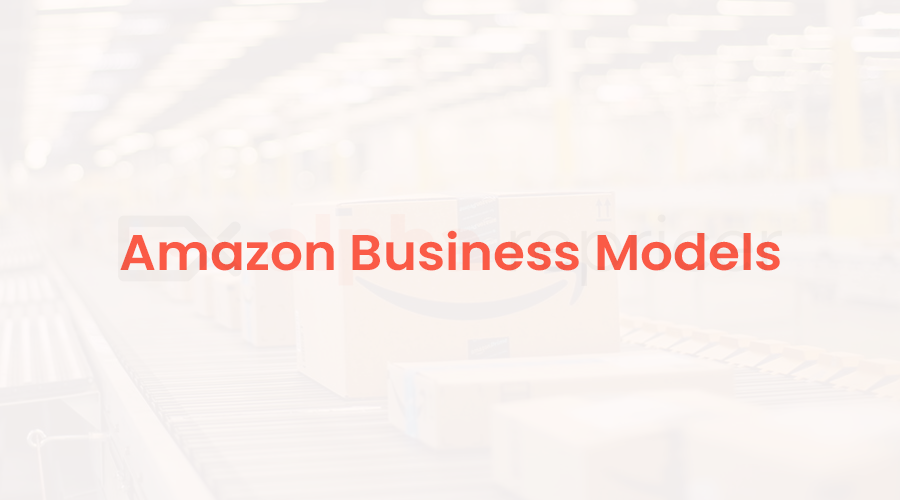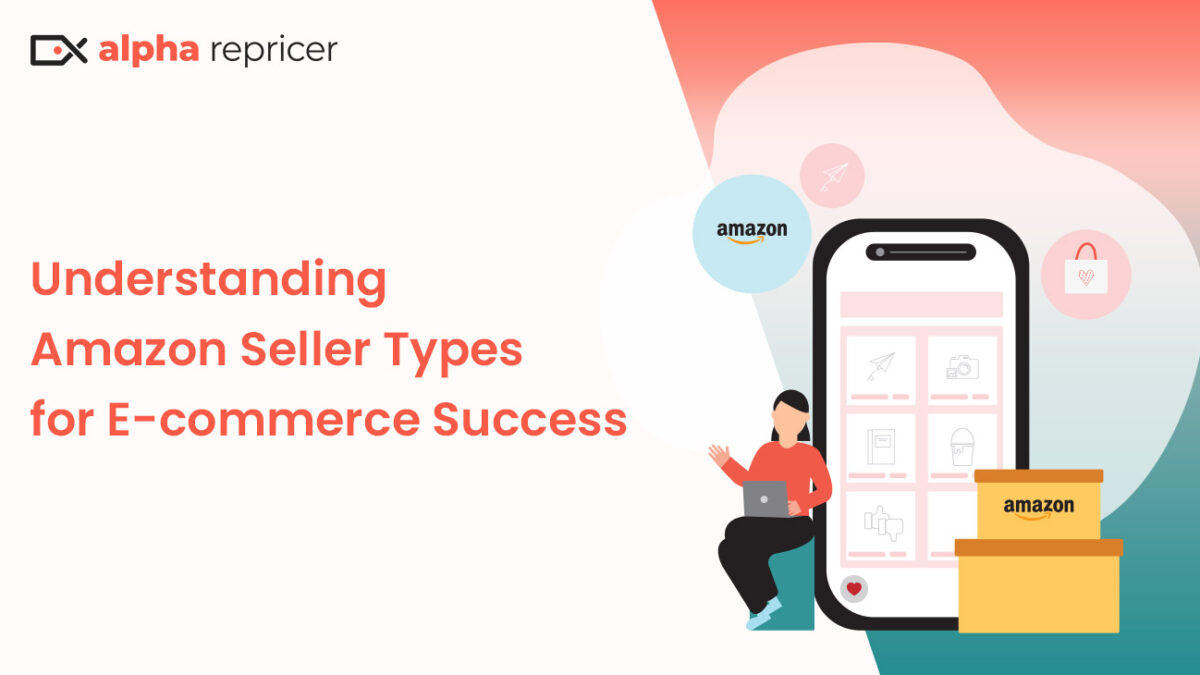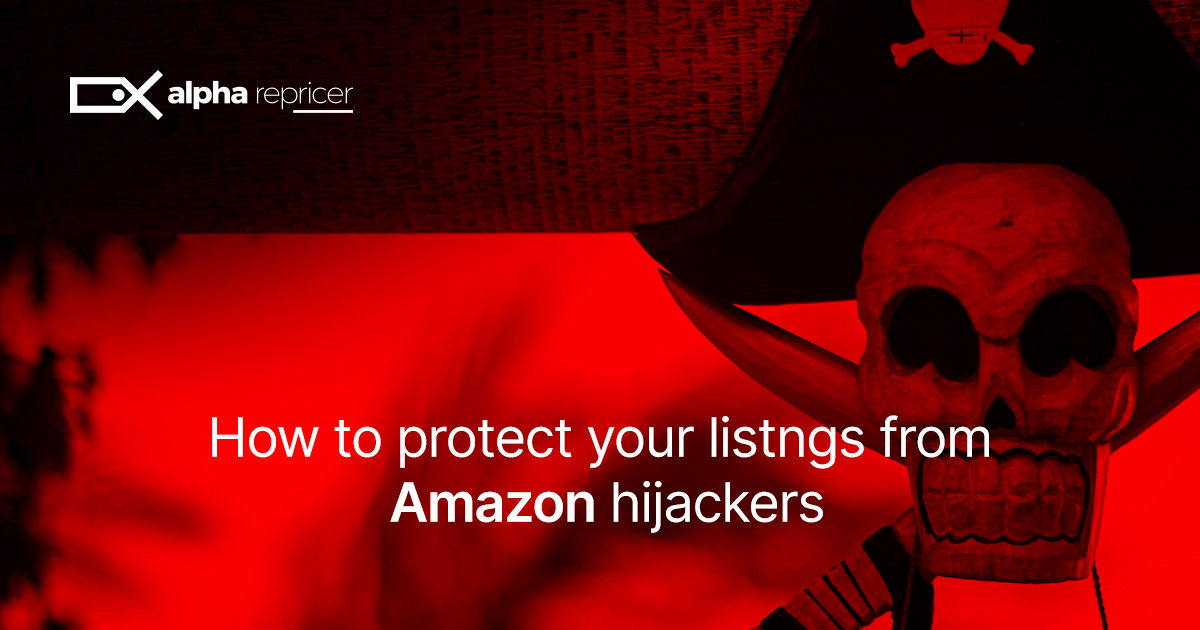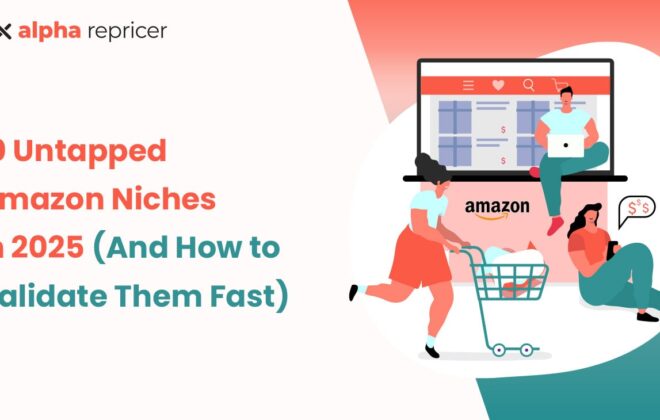How Understanding Amazon Seller Types Can Transform Your E-commerce Strategy
Amazon is undoubtedly the biggest e-commerce marketplace for sellers to reach millions of customers and sell their products around the globe. It gives your business the push it needs to grow, but we can not ignore that the platform comes with its own challenges.
The number of Amazon’s marketplaces and fierce competition can make things quite tricky for sellers. To succeed, one must understand how the platform functions and choose the correct approach for their business.
A crucial first step is learning about the different business models and seller accounts that Amazon offers. It doesn’t matter if you are just starting or running a larger business; it is important to figure out the best option that suits your business.
Each account type has its own perks, drawbacks, and strategies, so choosing the ideal one can make a huge difference in your journey to success.
We understand that it might take a lot of time for sellers to conduct research and learn about each seller type individually. To help out, we have come up with this guide that discusses all the main seller account types and business models in simpler terms.
You will also find the commonly faced challenges, tips to succeed, and advantages of using the right tools on Amazon here! By the end, you will have a clear idea of how to correctly use Amazon’s platform to grow your business and reach your goals.
First, let’s discuss the types of Amazon seller accounts that are the starting point for selling on Amazon.
Which Amazon Seller Account is Right for You? A Personalized Guide for Understanding Types, Key Features, and Choosing the Right One
The first step you take as an Amazon seller is choosing the right seller account. Amazon currently offers two main types, so you can move forward with either an individual or a professional account.
Let’s discuss their key differences and benefits to help you choose the best one for your business.

- Individual Seller Account:
An Individual Seller Account is ideal for people who plan on selling less than 40 items per month. In simple terms, it is best for small sellers who are new in the market or people wanting to start their own business on a small scale.
Perks:
- The good part is that you only have to pay a small fee every time you make a sale.
- You can easily set up the account and start selling as soon as you are done.
Unfortunately, if you choose an individual seller account, you will not have access to a dashboard with reports or advanced tools that could eventually help you scale.
However, if you are currently not a full-time seller and are starting it off as a hobby, then this account will definitely help keep costs low while you explore the market.
- Professional Seller Account
A professional seller account is the perfect choice for sellers who sell or plan to sell more than 40 items each month.
Perks:
- No per-item charges. You only have to pay a flat monthly fee, which makes it a cost-effective option for sellers dealing with high sales volume.
- Sellers can easily list their products in bulk, access sales reports, and customize shipping rates.
- Also, you get to showcase your products in top placements and can sell in restricted categories!
Our honest opinion would be to go for a Professional Seller Account only if you focus solely on becoming an Amazon seller and growing your business. This will help you scale quickly and work on the right e-commerce strategy accordingly.
After choosing the right account type for your business, the next step is to finalize a business model that aligns with your goals perfectly and is ideal for your products. Following are all the major Amazon Business Models that you can choose from:
Amazon Business Models: In-Depth Explanation, Key Advantages, and Potential Drawbacks for Your Business Success

We have been in the Amazon industry for quite a while now, and we suggest you start choosing a business model with a clear goal and aligned priorities. This will help you pick out the perfect model that sits perfectly with your vision rather than going through them all and getting confused by the end of it.
With that being said, the following are all the primary Amazon business models with their benefits as well as drawbacks to help you make a better decision:
Private Label:
Private Label means creating your own products and starting your own brand. For example, if a seller has designed unique notebooks or stationeries, they can sell them under their brand name on Amazon. This specific model promises higher profit margins as you enjoy full control over the brand.
Pros: Since you are the brand owner, it gives you control over the marketing, pricing, and customer relationships. Moreover, since your product differs from the rest of the market, it helps achieve high profit margins because there is no direct competition.
Cons: You need to invest a significant amount of money in the design, creation, branding, and marketing of your products.
Wholesale:
This model is quite simple. You buy products in large volumes from distributors or manufacturers to resell after keeping your margin. For example, a seller can purchase toys from a trustworthy source and resell them on Amazon.
Pros: When you work with known products, the best part is that their demand is already proven in the market. You don’t have to conduct thorough research or spend time on marketing efforts. The dealing and selling these products can be straightforward as people already know about them.
Cons: If your chosen product has high demand, your profit margins might suffer due to intense competition. Plus, it might be a struggle to find the right supplier that sells you quality products for less.
Retail Arbitrage:
Retail arbitrage is where sellers or beginners buy discounted products from their nearby/local stores and then resell them on Amazon.
Pros: This plan lets you start with minimal investment since you can stock up on clearance/sale items.
Cons: Everything remains uncertain. Inventory is inconsistent, and finding high-margin products can be time-consuming. For example, the items you stocked up on last month might not be available this month because the store could be out of stock, or the item might no longer be on sale, which can also impact your profits.
Online Arbitrage:
It is quite similar to retail arbitrage. The only difference is that you source products from online rather than physical stores. It is convenient if you ask us because you can research and order online without the hassle of in-store searching. However, it does come with similar challenges.
Pros: This model provides flexibility and gives sellers access to various products. Moreover, utilizing online tools can save plenty of time by comparing prices and finding the right deals.
Cons: Prices keep fluctuating online, which can affect your profit margins. Plus, increased competition online can also bring prices down.
Dropshipping:
Dropshipping has recently gained popularity since the model allows sellers to offer products without worrying about holding inventory. For example, if I want to sell phone cases, I can find a supplier, list their products in my store, and when I get an order, the supplier takes care of shipping it directly to the customer.
Pros: You don’t need to spend a lot of money upfront since you’re not buying inventory. Plus, you can easily add or remove products based on demand.
Cons: You rely on suppliers to ship on time and deliver good-quality products. Profits are usually smaller, and it can be hard to create your brand.
Handmade
This particular model is for all the creatives and artists out there. Sellers can craft beautiful, handcrafted products and sell them on Amazon. For instance, people these days are super interested in knitted scarves, sweaters, or hand-made jewelry.
Pros: Handmade products are unique and can be sold at higher prices because people like the special touch and the story behind them.
Cons: Making more products takes a lot of time and effort, and it can be hard to compete with cheaper, factory-made items.
We have tried our best to help you understand all the different Amazon seller types and hope that you pick the right business model to run a successful business online. However, even if you choose the ideal model, challenges will come up. It is important to learn how to tackle those issues, tweak your e-commerce strategy accordingly, and keep your business running smoothly. To help you through this, we have listed down common problems sellers face and how to fix them:
Common Challenges Amazon Sellers Face: Effective Solutions to Overcome Them
No matter what your business type is, Amazon will give you a tough time somewhere down the line. Let’s talk about the most common issues and how to handle them:

Competition:
Amazon is packed with sellers trying to make a living by competing against one another. There is no doubt that someday you will be caught up in a price war, too. However, to differentiate yourself from others, make sure to work on your branding, offer exceptional customer service, and focus on selling products that are high in demand but unique.
For example, design beautiful thank-you notes for your packaging and personalize them so the customer feels valued. Add that extra touch to please them.
Account Health:
Sellers need to follow all of Amazon’s rules or else face account suspension, which can be a nightmare. To avoid this fear, keep checking for updates and ensure your listings are per Amazon’s policies.
Inventory Management:
If you choose a business model where you need to order and store inventory, it can get quite tough. Ordering too much can lead to high storage or maintenance costs. On the other hand, ordering too little means you risk losing sales to others if you run out of stock. If you have time, read our blog on how to manage if you run out of inventory. Otherwise, a simple solution is to use an inventory management tool.
Customer Feedback and Reviews:
Positive reviews can definitely get you a prime spot on Amazon, but you have to work hard to get them. The key is to provide top-quality products and give great service. For instance, once you have delivered your nicely-packed products to the doorsteps of your customers, you can email them, asking if they are pleased with the product. For more such examples, read our blog.
Amazon Charges:
Amazon charges different types of fees depending on the fulfillment method you choose. On top of that, there are referral fees and some hidden charges that can impact your profit margin. To understand and calculate these fees properly, our suggestion would be to use FBA calculators. These tools help you figure out what your right profit margin should be after accounting for all the fees.
We’ve hopefully covered all the potential challenges you might face, but what about the ones that even we can’t see coming? Based on our experience, we want to share some tried-and-tested tips to help you plan your e-commerce strategy in a way that protects you from any unforeseen problems before they happen!
Practical Tips for Aspiring Amazon Sellers: Proven Strategies to Help You Win
Here are a few tips that can help you stay ahead on Amazon:

- Do your Market Research, and do it well:
Before selecting any business model, make sure you go through all the latest trends, demand, and competition in the market. If you don’t want to do it yourself, use a tool like Jungle Scout to help.
- Get Top-Quality Images:
Your product images should look like a work of art. Detailed, beautiful, and high-resolution images help attract customers and prevent them from thinking your product is fake just because of blurry pictures.
- Product Descriptions Should Be Top-Notch:
You don’t want customers to visit your product page, struggle to understand what you’ve written, and leave, right? Use clear and concise language, but make sure your product descriptions are well-written to help customers make informed decisions.
- Amazon Advertising:
Running ads on Amazon can be a great way to boost the visibility of your product, especially under categories with massive competition. They help you get that prime spot so buyers don’t ignore your listing.
- Keep track of your performance:
Regularly monitor your product performance, sales, and customer behavior. Make sure to adjust your strategy accordingly.
- Build Relationships with Customers:
get back to your customers’ queries on time and resolve their issues as soon as you can. Happy customers often lead to repetitive sales and good reviews.
- Experiment with pricing Strategies:
Pricing can have different goals. For example, if you want to win the buy box, you’ll need to price competitively. If you’re aiming for a higher profit, you’ll set your prices accordingly. It’s important to match your pricing strategy with your goal and adjust as needed.
If you don’t have enough time to keep adjusting your product prices, let us recommend a tool that can effectively resolve all your pricing issues:
How Alpha Repricer Has Transformed the Game for Amazon Sellers:
Staying competitive in pricing is one of the toughest challenges for Amazon sellers. Alpha Repricer, an automated tool, simplifies this by adjusting prices based on market trends and competitor activity. For instance, a seller using Alpha Repricer can secure the Featured Offer position more often, boosting visibility and sales. Its real-time analytics and user-friendly interface make it a must-have for scaling your business. In short, it is an ideal tool to have if you want all your pricing worries gone.
We’ve covered almost every aspect of business models and everything that goes into creating an e-commerce strategy, including challenges and tips.
But are there any real-life examples of sellers who have overcome these challenges, adjusted their strategy, and succeeded on Amazon? Let’s find out!
Case Studies: Real-Life Examples of Amazon Sellers

A Switch to Private Label Helped Them Grow Their Business:
One of our clients started his Amazon business under the retail arbitrage model. He would purchase discounted electronics from clearance sales and then resell them on Amazon. At first, things were going well, but he soon faced several challenges. He ran out of stock, and when he tried to restock, the prices had gone up. On top of that, he struggled to compete with other sellers offering lower prices. Realizing this model wasn’t working, he decided to make a change. He started his own brand of unique laptop stands, giving him full control over his business operations. The business took off quickly, and he started earning more. He signed up with Alpha Repricer to handle his pricing, and now he’s one of the top sellers on Amazon.
A switch in models and issues along the way:
One seller started wholesale, buying fitness gear in bulk and reselling it. But soon, they realized it wasn’t as easy as they had hoped. Bigger sellers were able to offer much lower prices, which made it harder for them to make a decent profit. Rather than giving up, they decided to give retail arbitrage a try. They focused on seasonal items like holiday decorations and clearance sportswear. By staying ahead of trends and being flexible, they were able to find success and see their profits grow.
This example shows that no particular business model is “bad.” It all depends on what works for you. Some models suit your goals better than others, so choose the one that aligns with your end goal. Picking the right strategy and staying adaptable can make all the difference.
In Conclusion:
If you want to start selling on Amazon and be successful, it’s important to pick the right business model and plan your strategy accordingly. The journey won’t be easy, and no matter what model you choose, you’ll face challenges along the way. But by using the tips and tools we’ve shared, you’ll be able to solve most of these problems. Remember, once you find success on Amazon, there’s no stopping you. So, keep going and make sure you succeed! Happy selling!
Author
-
Meet Noor Jarri, a seasoned writer specializing in the dynamic world of Amazon. With over three years of experience, Noor has become a trusted resource for Amazon sellers seeking guidance on repricing strategies and navigating the e-commerce landscape.
View all posts
As a valued contributor to Alpha Repricer, Noor's expertise shines through in her engaging blog articles, press releases, and guest posts. Praised for her skill in crafting content that is both informative and approachable, Noor's writing is a knowledgeable resource for sellers of all levels. Beyond her professional pursuits, Noor is an avid traveler and culinary enthusiast. She finds inspiration in exploring new destinations and experimenting with recipes from around the world.
Join Noor Jarri on her journey as she continues to empower Amazon sellers with insights, tips, and strategies to thrive in the ever-evolving marketplace.
Noor Jarri
As a valued contributor to Alpha Repricer, Noor's expertise shines through in her engaging blog articles, press releases, and guest posts. Praised for her skill in crafting content that is both informative and approachable, Noor's writing is a knowledgeable resource for sellers of all levels. Beyond her professional pursuits, Noor is an avid traveler and culinary enthusiast. She finds inspiration in exploring new destinations and experimenting with recipes from around the world.
Join Noor Jarri on her journey as she continues to empower Amazon sellers with insights, tips, and strategies to thrive in the ever-evolving marketplace.





